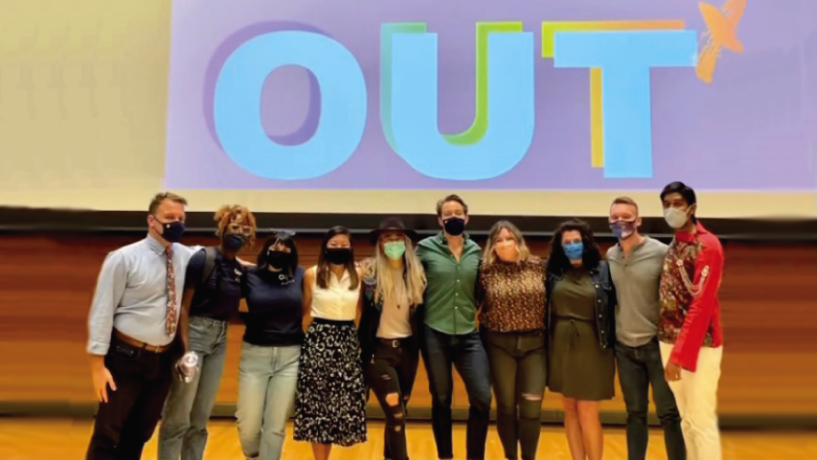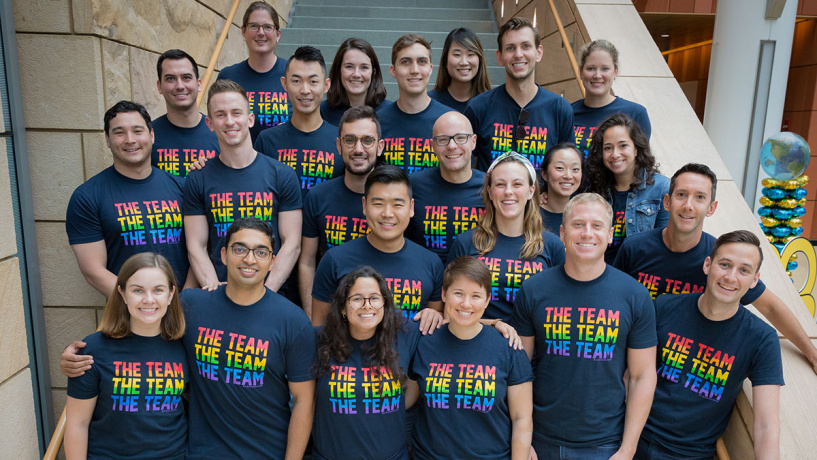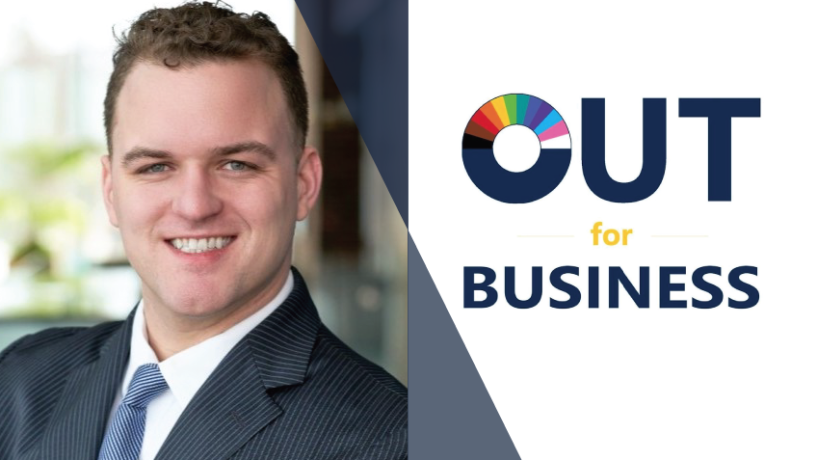Q&A: Michigan Ross MBAs in Out For Business Share Important Insights for Pride Month
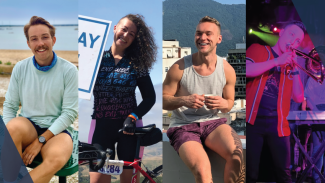
Pride Month has been a time of recognition and celebration for the LGBTQ+ community, but in recent years Pride has increased in significance as members of the community face a number of new legislative challenges, including many related to education policy.
At the Ross School of Business, Out for Business is a student organization that seeks to build a strong, diverse community of LGBTQ+ and allied members, where all are welcomed, celebrated, and valued. They also provide career development resources to members and work to raise awareness among Michigan Ross faculty, staff, and students of the issues, experiences, and intersectional identities among LGBTQ+ individuals in the workplace and society.
This year, four OFB members in the Michigan Ross Full-Time MBA Program took on important questions related to their understanding of Pride, their identity, being part of OFB, and more.
Rachel Sze (she/they)
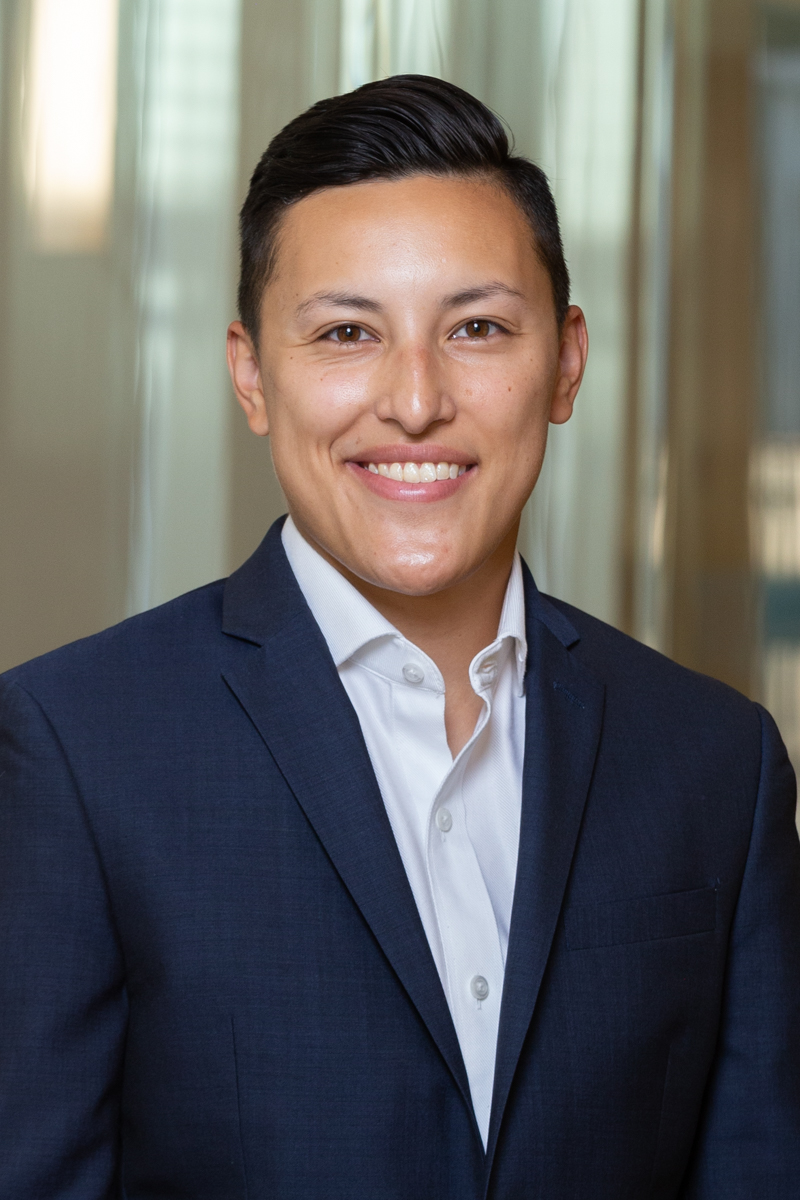 Program/year: MBA ’23
Program/year: MBA ’23
OFB role: Vice president of allyship and diversity
Hometown: Gaithersburg, Maryland
Summer internship or job: Summer associate at Bain & Co., Washington DC
Pre-Ross industry: Education
How has your understanding of Pride evolved since coming out?
My first Pride in Washington, D.C., was awe-inspiring. I’d never seen so many queer folks! While I didn’t even quite fully understand my identity at the time, I felt the power of seeing a visible LGBTQ+ community. Back then, it was less a remembrance of our shared queer history and an opportunity to serve the community, but rather an opportunity to have fun and be seen. Volunteering my time this month for Pride at parades, for Mutual Aid, and marches for justice gives me a great feeling of satisfaction.
Has it changed in recent years as the political climate has evolved for LGBTQ+ people?
Yes, and unfortunately the political climate of recent years has changed, and not for the better.
This is something I acutely feel as a former queer public educator. To me, the torrent of anti-trans legislation signals a willingness to prosecute us and find ways to push us back to the margins. Although there are so many crises demanding our attention right now, it has never been more important for allies, especially those who are willing to take part in Pride celebrations this month, to use their voices to bring attention to the abhorrent legislation being passed across the United States.
How has being a member of Out for Business impacted your time at Ross?
OFB is another incredible community that I have the pleasure to call home at Ross. I love the drive that OFB has to pay it forward for current business students and the next generation.
How do you think about intersectionality for yourself and within the larger LGBTQ+ community?
As a multi-racial person of color, it is impossible not to think about it. Especially in the context of business school, I personally find it crucial to also consider the intersection of LGBTQ+ identity and class. As MBAs, the education, access, and jobs/income available to us can help to shield us from some of the more devastating discrimination the LGBTQ+ community faces. Instead, I believe it must imbue me with a sense of responsibility to use that power for the betterment of the entire community.
Mantas Butanavicius (he/him)
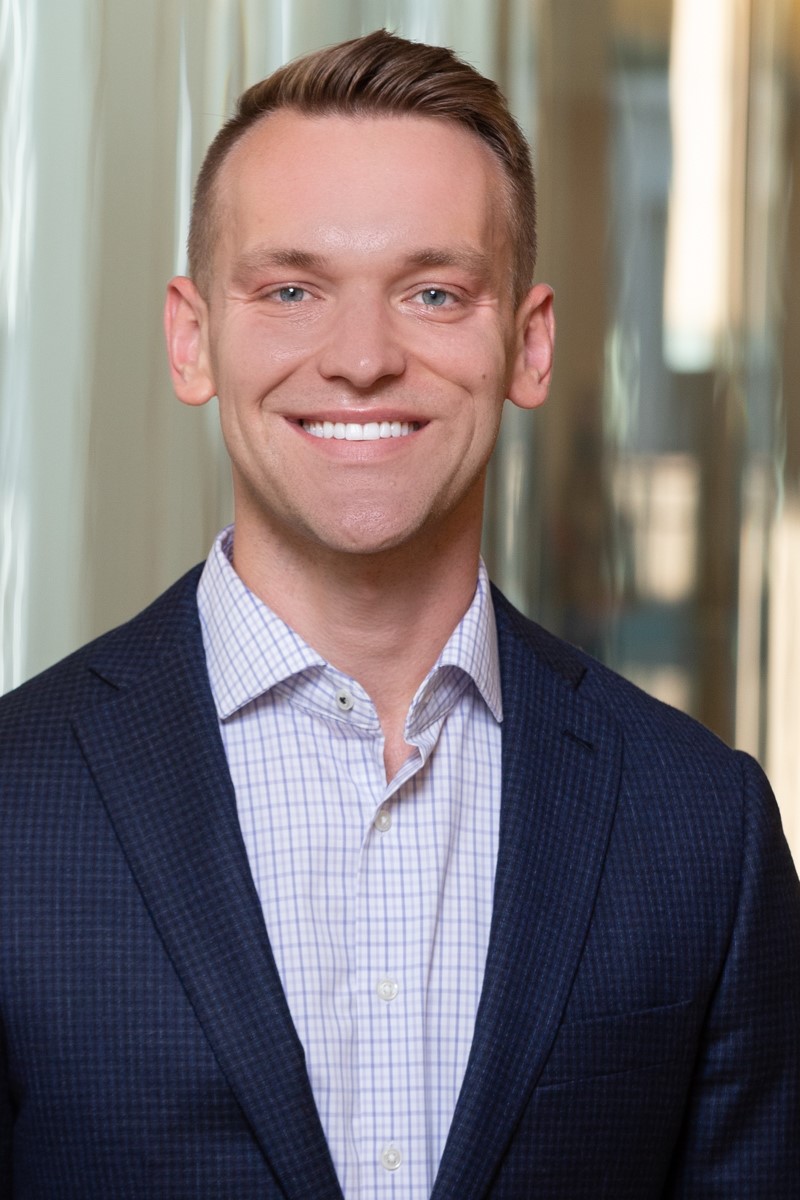 Program/year: MBA '23
Program/year: MBA '23
OFB role: Vice president of marketing and communications
Hometown: Marijampole, Lithuania
Summer internship or job: Business value at Salesforce
Pre-Ross industry: Consulting
How has your understanding of Pride evolved since coming out?
At first, Pride for me was inward. It was the process of self discovery, self acceptance, and finding the ability to love and appreciate my own queerness. But as the years have passed, I’ve come to see that Pride is outward, too. Pride shows the world we’re here while also placing us firmly in that world. It carves out space for us, it holds space for the ones who have yet to find themselves, and makes it so the world cannot so easily shut us out.
Has it changed in recent years as the political climate has evolved for LGBTQ+ people?
In the immediate afterglow of the achievement of marriage equality here in the United States, people began to wonder if Pride was necessary any longer — because it seemed like we’d won. More progress seemed assured. We were fixing things, we were moving boldly forward into the future, and we forgot that progress is never guaranteed. That complacency will cost us dearly. What seemed unthinkable 10 years ago is suddenly, unbelievably possible. For some of us, the world may start to spin backward. This is why Pride is now more necessary than ever before, and keeping its traditions alive will keep us alive, too.
How has being a member of Out for Business impacted your time at Ross?
Meeting some of the most dynamic doers, movers, and shakers at Ross has turned a business degree into something else entirely. My time as an active board member of Out for Business has allowed me to expand my perspective, cultivate new friendships, and become part of the local queer community here in Michigan.
What is something that you want people to know about your experience as an LGBTQ+ person that you think gets lost in the media or popular culture?
Popular media and pop culture still struggle to do justice to queer history. There is strength and magic in our history, even despite its tragedies. Our queer forebearers lived in a very different world than our own; yet their struggles have yielded freedoms that may have seemed unthinkable for them in their own time. And then we lost a generation to the AIDS epidemic. We lost countless stories that will forever be left untold, and lost an older generation that would have passed down its knowledge to us otherwise. Pop culture is left to fill in the gap, and RuPaul’s Drag Race cannot shoulder the entire burden itself.
Much of what we see depicted as “gay” in pop culture or the media centers on American queerness, and gives short reference to the rest of the world. But there is an entire world full of queers who live outside of the American paradigm whose stories are just as compelling, and we owe it to them and ourselves to find them. My life could have been vastly different if queers in Lithuania were visible before me.
Michael O’Gorman (he/him)
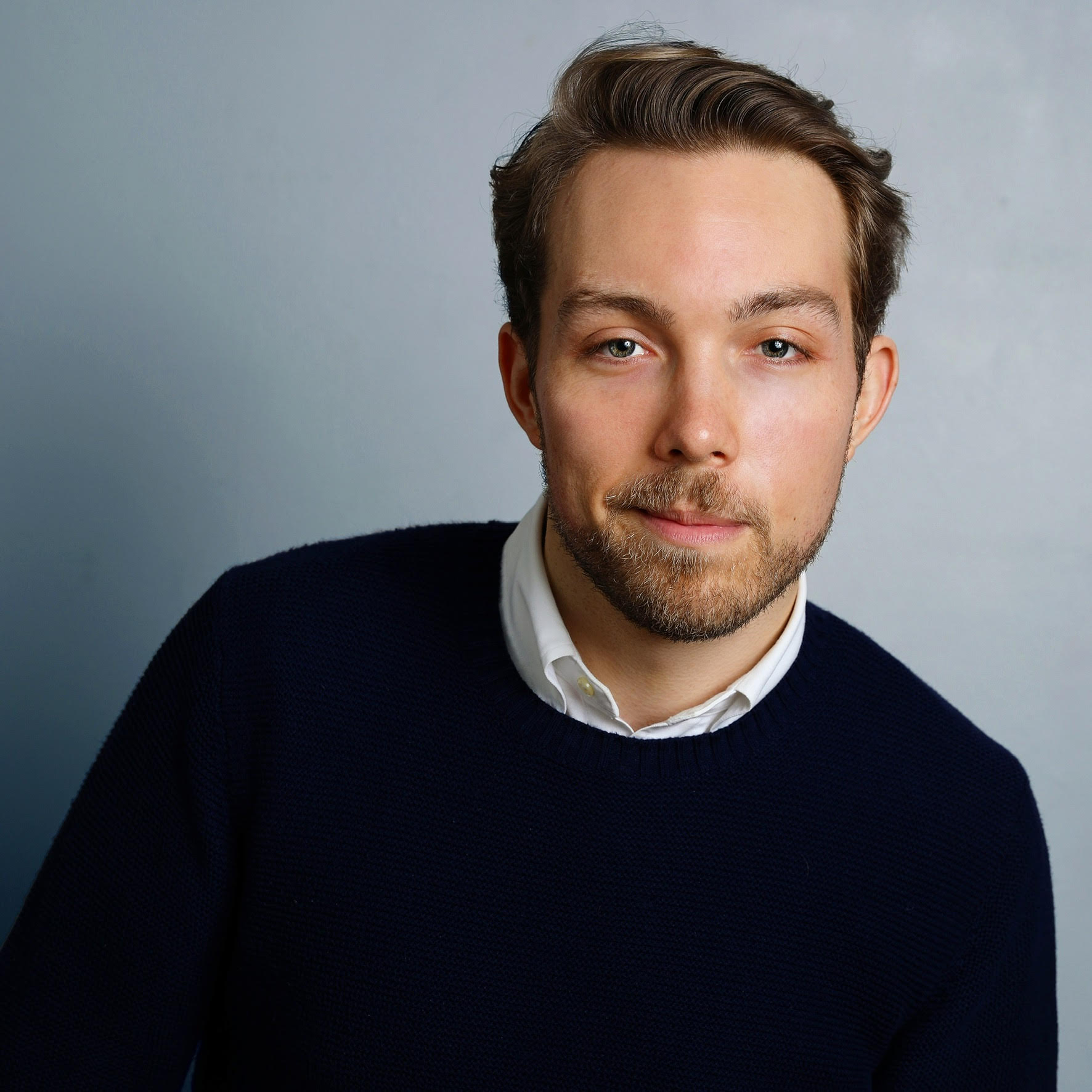 Program/year: MBA ’23
Program/year: MBA ’23
OFB role: Co-president
Hometown: Brooklyn, New York
Summer internship or job: Summer Consultant at EY-Parthenon, New York, NY
Pre-Ross Industry: Public education / government
How has your understanding of Pride evolved since coming out?
Pride has always been about celebrating openly, but I used to think of Pride as being about “Love is Love” and striving for marriage equality. Now I think of Pride as still being a big celebration, but one that centers on the different lives we should live because we aren’t burdened with the same expectations as our non-LGBTQ+ peers. We can be and do whatever we want on whatever timeline we want — including creating our own chosen families and communities. This can be scary because there is no predetermined path, but once you embrace it, you are closer to being liberated.
Has it changed in recent years as the political climate has evolved for LGBTQ+ people?
Absolutely! I think that there is a very vocal and powerful segment of the LGBTQ+ community that attempted to assimilate to traditional heteronormative values for decades. We now see that even with fuller (not yet full) federal rights and protections, we have not assimilated. In fact, a lot of the political rhetoric and rancor, particularly from the right in America, is regressing at best, and becoming downright dangerous at worst. The language politicians and pundits use to describe LGBTQ+ people is returning to what we used to hear during the AIDS crisis and before. It’s quite concerning.
How has being a member of Out for Business impacted your time at Ross?
Moving from New York City where my entire life was full of queer people, I was worried about coming to Ann Arbor and not having a strong sense of queer community. OFB has helped me find a community of folks who share similar experiences — both personally and professionally. Ann Arbor, surprisingly, isn’t too different from my old neighborhood in Brooklyn.
What is something that you want people to know about your experience as an LGBTQ+ person that you think gets lost in the media or popular culture?
Wider representation in media does not necessarily equate to wider acceptance, and it does not necessarily equate to wider feelings of safety and belonging. I still constantly think about how I am walking, talking, and carrying my body based upon the room, elevator, train, or streets where I find myself.
Jill Dannis (she/her)
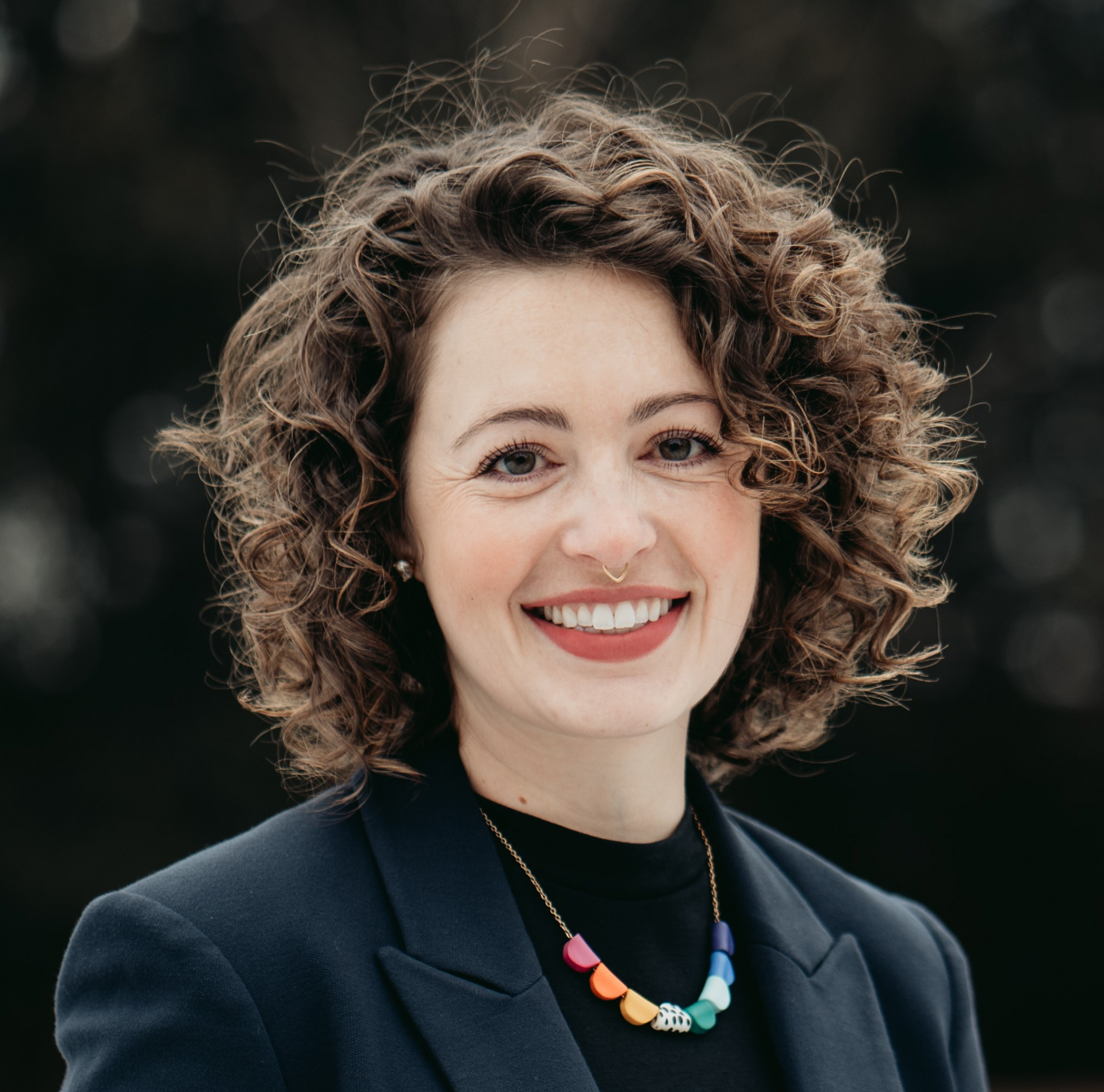 Program/year: MBA ’23
Program/year: MBA ’23
OFB role: Co-president
Hometown: San Francisco Bay Area, California
Summer internship or job: Human resources leadership development program intern on the Earth's Best Employer team at Amazon Web Services
Pre-Ross industry: Non-profit / LGBTQ+ organizations; entertainment
How has your understanding of Pride evolved since coming out?
I attended my very first Pride parade when I was 18, the day after my high school graduation. At the time, Pride was very rainbow, loud, and celebratory for me. It was exciting to claim my identity as a queer woman and lesbian and find community. My understanding of Pride has evolved over time to be more personal and introspective to some extent, as well as more public and actionable at the same time. Pride for me is year-round, and now includes taking action with and for my community to build toward a better queer future by doing things like AIDS/Lifecycle or starting an LGBTQ+ employee resource group at work.
Has it changed in recent years as the political climate has evolved for LGBTQ+ people?
Yes! It’s been scary to see the rhetoric being used right now about LGBTQ+, and more specifically, trans people. It feels like a major regression, and I think it’s our responsibility as a community to center those that are most marginalized. This means centering trans folks, queer people of color, trans and queer youth, etc. in our work, conversations, community building, and more. Our community is under attack right now in ways that feel new but also familiar, and these attacks are going to impact different people in the LGBTQ+ community in different ways. I feel a responsibility to be a vocal and visible queer person fighting against that in all of the spaces (school, work, etc.) I have access to and privileges in.
How has being a member of Out for Business impacted your time at Ross?
My pre-Ross life in Los Angeles was very queer, especially having worked primarily in a LGBTQ+ organization. OFB has been amazing for connecting with other queer MBAs and finding professional opportunities through things like Reaching Out MBA. It’s also impacted my time at Ross by providing a platform through which to engage in broader conversations driving LGBTQ+ inclusion and equity at Ross and in business.
How do you think about intersectionality for yourself and within the larger LGBTQ+ community?
The LGBTQ+ community can include anyone — literally all identities can intersect with queerness. For me, as a white, cisgender, able-bodied, femme, queer woman, this requires that I take ownership of my learning and awareness to try to understand the experiences that folks in my community are having that are different from my own. I fully believe that “with great power comes great responsibility.” As an MBA student, a student leader, and a future business leader, I am in a position to drive change. This means I have a responsibility to advocate for the larger LGBTQ+ community however I can, both now and in the future.
Advice for prospective LGBTQ+ business school students
Business needs more queer people. We need more people who are going to bring their full selves into corporate America to question and potentially break down some of the systems and barriers in place that really need to change. Also, I’ve found having a ‘nontraditional background’ to be an asset.
You are wanted, your LGBTQ+ perspective is missing, know yourself and harness the power of your story.
Purpose: have a crystal-clear purpose in mind. This is a significant investment in terms of money, time, and energy, and this investment deserves clarity of purpose and drive to see it through.
Who you are is not a liability, it is an asset. The lived experience that you bring/would bring to business school is valuable. Community exists here!





